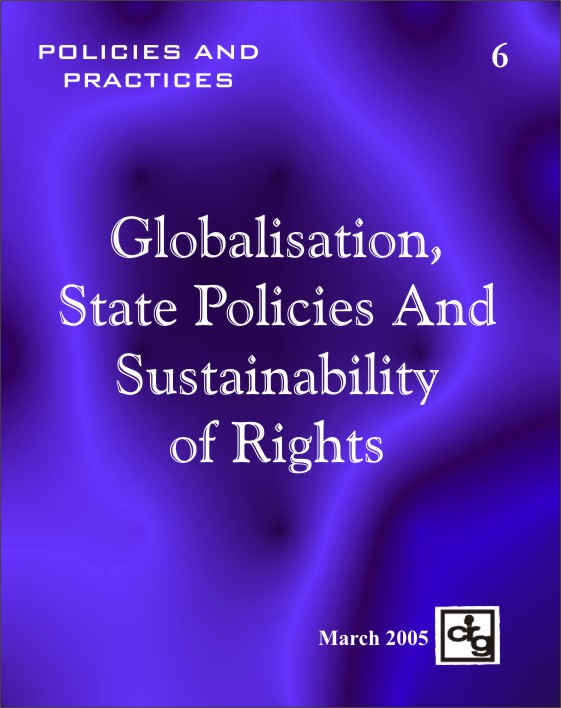|
|
 |
|||
| 2005 |
|
|||
|
Policies
and Practices 8 Examining Autonomy: The73rd Constitutional Amendment in Assam In this paper the author raises a question what does it really mean to be What does it really mean to be autonomous to a woman? Does it mean self-determination, morality, governmentality, accommodation, or simply a conciousness of autonomous self. There is a particular significance in examining the gendered nature of the term because while autonomy may mean all the above for a man, for a woman the effort to simply acquire the consciousness of an autonomous self may take a life time. Every step she takes towards it is swallowed by the multiple layers of "social selves" which she is expected to acquire by the society. This paper attempts to locate female autonomy in the realm of governance, (something that denotes rights,transaction, government, negotiation, and relating to others on the basis of set rules), while examining the recent 73rd and 74th constitutional amendment that ensures 331/3 % of seats to be reserved for women at every level of the 3 tiered Panchayati Raj Institution. Assam which was almost ten years late in implementing the amendment finally held the panchayat election in 2001.
Essay by
Sujata Dutta Hazarika |
|
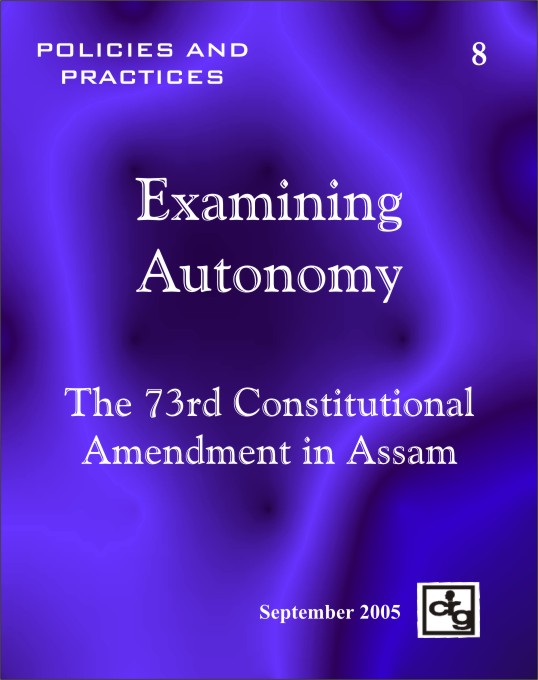 |
||
|
Policies
and Practices 7 Fourth in the series of CRG’s research and discussion programme on autonomy this paper deals with the vital questions of autonomy in two of the conflict zones, Jammu and Kashmir in North and Assam in North East India. Both the essays deal with the question of autonomy and its relationship with the national security, issues of identity, citizenship, sovereignty and demand for a separate homeland. The essays critically examine the role and dynamics of various stakeholders such as state, local community groups and the popular sentiment in rest of India. Essays by Sanjay Chaturvedi and Sajay Barbora
|
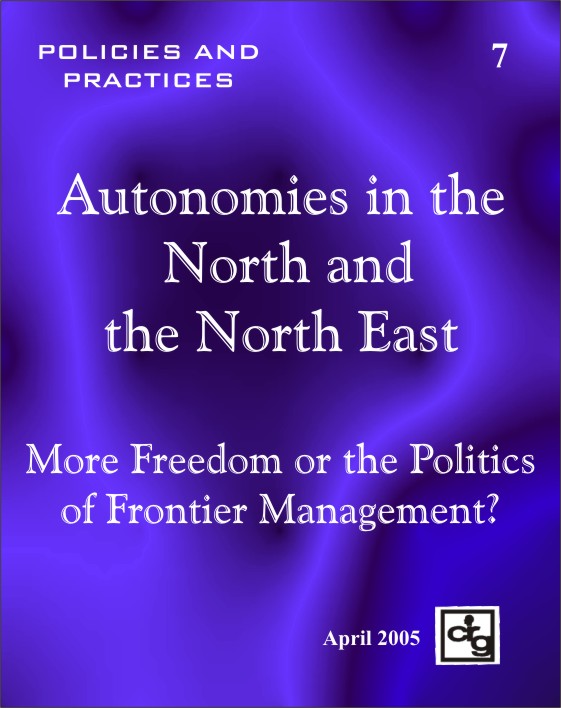 |
|||
|
Policies
and Practices 6 This monograph part of the research programme on state policies and the sustainability of socio-economic rights in the context of globalisation presents a critical examination of provisions of a number of state policies. This volume is an attempt to investigate the policy explosion in past one and half decade, and study particular policies and their features. The overriding concern in this enquiry is: where and to what extent do rights of marginalised communities feature in this landscape of policies, which are occasioned by globalisation.
Essay by Madhuresh Kumar
|
|
|||
|
Policies
and Practices 5 The monograph part of the CRG’s Gender, Media and Human Rights programme examines the problematic of asymmetry in communication in matters of health and disasters amongst state, media and citizens. It shows how the matters of health and disaster are communicated to the public, the dynamics of communication, its one-way nature, the erasure of certain themes and actors, and the valorisation of others. Unequal communication is about media study, study of disasters and scandals, gender study, and shows in an unequal society communication do not flow horizontally, it flows vertically – from top to bottom and from powerful to the powerless. Essays by Nilanjan Dutta , Dulali Nag and Biswajit Roy |
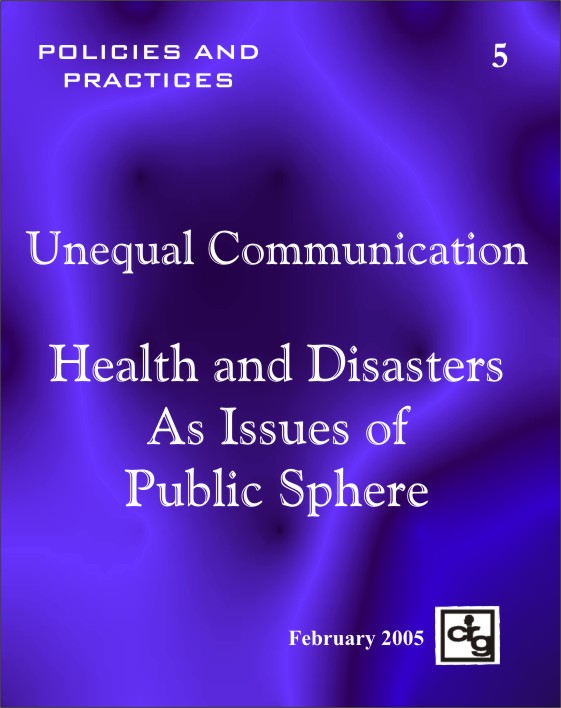 |
|||
|
Policies
and Practices 4 Third in the series of CRG’s research and discussion programme on autonomy this paper examines the question of women’s autonomy in socio-economic and political matters. Starting from the debates of constituent assembly author critically examines the recent days controversies around the laws pertaining to women. It also gives a glimpse of the women’s movements struggle for autonomy since independence. Essay by Paula Banerjee
|
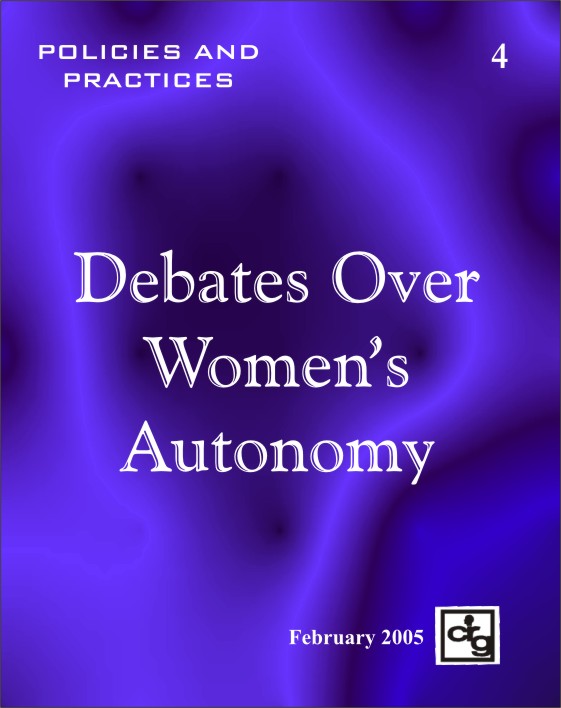 |
|||
|
Policies
and Practices 3 Second in the series of CRG’s research and discussion programme on autonomy this paper presents a review of the various peace accords signed by Indian government with groups in North East. It critically examines their efficacy in addressing the issues of political and fiscal autonomy demanded by these groups. The argument that peace accords are tools ‘strategically deployed’ alongside force and coercion by the state in order to establish and perpetrate its ‘domination’ over the adversaries is worth noting. Essay by Samir Kumar Das
|
 |
|||
|
Policies
and Practices 2 First in the series of CRG’s research and discussion programme on autonomy it deals with fiscal decentralisation and its management by the state. Decentralised governance believed to ensure efficiency in the functioning of the state in a civil society is in much debate for quite long. However, often the debate is focussed more on the political aspect of it than the economic aspects. This paper takes a critical look at the fiscal decentralisation and traces its development since independence. Interspersed with data and analysis the paper looks at various constitutional provisions and government’s commitment towards fulfilling them. Essay by Ratan Khasnabis
|
 |
|||
